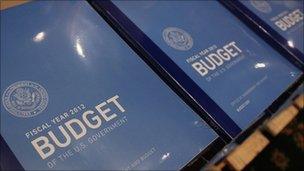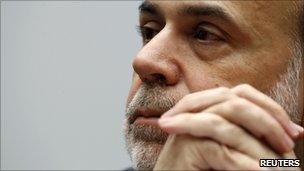Congress delays US government shutdown over budget cuts
- Published

House Republicans are pushing for deep cuts in government spending
The US Congress has passed a bill extending funding for the federal government by two weeks, staving off a possible government shutdown.
It comes as politicians continue to tussle over Republican plans to cut federal domestic spending by a quarter.
The bill contains $4bn (£2.5bn) in agreed cuts, well short of the $60bn targeted by Republicans.
Meanwhile, Federal Reserve chairman Ben Bernanke said the cuts plan would cost the US economy 200,000 jobs.
"I would like to see job creation," said Mr Bernanke, speaking to the House Financial Services Committee, adding that the impact was "not trivial".
'Modest' growth
The 200,000 figure he cited is equivalent to about 0.13% of the US labour force.
His estimate was well below the 700,000 potential job losses cited by some Democrats, but conflicted with Republicans' claims that their cuts plans would be job-creating.

Mr Bernanke told Congress that the cuts would hurt jobs, whereas his task was to create jobs
In contrast, the Fed chairman said the likely impact of the cuts on growth would only be about 0.2% this year and 0.1% next.
His comments came as the Fed announced that the US economy had grown in the last two months at a "modest to moderate rate".
The monetary authority's "Beige Book", external - which collates anecdotal evidence and leading indicators about the economy - said wage growth remains weak.
However, it also noted that job prospects "modestly improved across the economy" in January and early February.
Day of reckoning
Republicans control the House of Representatives - the lower chamber of Congress - but not the Senate.
They have been threatening Washington DC with an effective shutdown if the cuts are not passed, by refusing to raise the federal government's borrowing limit.
Although the government cannot exceed its borrowing cap by law, perversely that does not prevent Congress passing legislation that creates unfunded spending commitments.
House Representatives endorsed a tax-cutting package at the end of last year that significantly increased the current US budget deficit.
The extension bill only postpones the day of reckoning by two weeks, to 18 March, with Democrats claiming that is not enough time to reach an agreement over the budget.
Counter-proposal
"We cannot keep doing business this way," said President Barack Obama, shortly before he signed the stop-gap bill into law.
"Living with the threat of a shut-down every few weeks is not responsible, and it puts our economic progress in jeopardy."
Senate Democrats are preparing their own counter-proposal to the Republicans' cuts.
Mr Obama has asked Vice-President Joe Biden to broker an agreement between the two sides.
The federal government last experienced a shut-down in the mid-90s during Bill Clinton's presidency.
On that occasion, most voters blamed Newt Gingrich's Republicans.
But this time round it is unclear whose electoral prospects would be damaged if a deal is not reached.
- Published1 March 2011